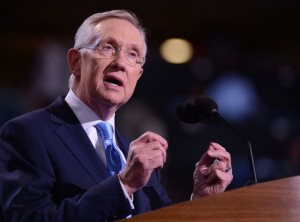
By David Lightman and William Douglas, McClatchy Newspapers –
CHARLOTTE, N.C. — Democrats staked out unmistakably liberal positions on some of the nation’s most volatile social issues Tuesday, notably abortion and gay marriage, planting the party as firmly on the political left as Republicans are on the political right.
The differences are vividly reflected in the two parties’ platforms. For years, platforms strived to be lofty and gentle, brushing aside any hint of extremes while couching controversial positions in language carefully crafted not to offend swing voters.
Not anymore. The Democratic platform lights a fire from the start, fans the flames and urges votes to pick sides.
“This election is not simply a choice between two candidates or two political parties,” it says, “but between two fundamentally different paths for our country and our families.” Republicans at least agree on that much.
The firefight reflects two significant trends: Both parties see 2012 as a “turnout election,” where getting out the faithful could mean the difference, and both parties’ ideological wings are now firmly in control.
“The platform is most important to Democratic Party activists more, and feminists,” said John Green, a senior fellow with the Pew Forum on Religion & Public Life. “For the Democratic activists, these issues are a plus. If you look at the Democratic Party voter, there are some constituencies that care about these issues, particularly women.”
So, too, with Republicans, whose strong opposition to abortion and gay marriage is a surefire base-motivator.
Neither stance is particularly new or surprising, but some of the details and tough language are. Since the Supreme Court’s 1973 Roe v. Wade decision, which permitted abortion in most cases, the Democratic Party has supported the ruling.
In 1980, as conservatives gained control of the Republican Party, its platform was quick and pointed: “While we recognize differing views on this question among Americans in general — and in our own party — we affirm our support of a constitutional amendment to restore protection of the right to life for unborn children.”
Democrats also kept the language soft. In 1996, the party wrote in its platform: “We respect the individual conscience of each American on this difficult issue, and we welcome all our members to participate at every level of the party.”
The party’s goal, it wrote, is “to make abortion less necessary and more rare, not more difficult and more dangerous.”
This year, such niceties are all but gone. You’re either with us or you’re against us, they seem to say.
“The Democratic Party strongly and unequivocally supports Roe v. Wade and a woman’s right to make decisions regarding her pregnancy, including a safe and legal abortion, regardless of ability to pay. We oppose any and all efforts to weaken or undermine that right,” the 2012 platform says.
The word “rare” is not used. There are no exceptions to allow any limits on the right to abortion, such as laws requiring parental notification or a ban on the late-term procedure called “partial-birth” abortion.
The 2012 platform takes aim at Republicans: “Abortion is an intensely personal decision between a woman, her family, her doctor and her clergy; there is no place for politicians or government to get in the way.”
The Republican view on abortion takes three paragraphs. The platform endorses a human life amendment to the Constitution, and makes no references to exclusions. Republican nominee Mitt Romney says abortion could be permitted in cases involving rape, incest or a threat to the woman’s life.
Both parties see political gain.
Democrats angle to strengthen President Barack Obama’s already-big lead among women. Republicans counter that women care most about economics, not abortion — but they aren’t shy about promoting their view as a way of firing up their base.
Gay marriage also has bitterly divided the two parties. Democratic platforms have supported gay rights since 1980, though in 1996, President Bill Clinton signed the Defense of Marriage Act into law, which defines marriage as the union of a man and woman. Obama personally opposed gay marriage, as well, until recently.
This year’s platform rejects that notion.
“We support marriage equality and support the movement to secure equal treatment under law for same-sex couples. We also support the freedom of churches and religious entities to decide how to administer marriage as a religious sacrament without government interference,” it says.
Republicans differ: “We believe that marriage, the union of one man and one woman, must be upheld as the national standard, a goal to stand for, encourage and promote through laws governing marriage.”






